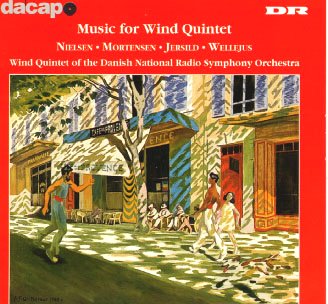NIELSEN: Wind Quintet
MORTENSEN: Wind Quintet
JERSILD: Serenade
WELLEJUS: Wind Quintet
 Wind Quintet of
the Danish National Radio Symphony Orchestra
Wind Quintet of
the Danish National Radio Symphony Orchestra
 Da Capo 8.224151
(72
minutes)
Da Capo 8.224151
(72
minutes)
Crotchet

Carl Nielsen's Wind Quintet (1922) was written for musicians he knew well,
and his understanding of the possibilities offered by this ensemble is one
of the music's strengths. Has a greater wind quintet been written?
This disc is particularly successful. The players of the Danish Radio Symphony
Orchestra have a special understanding of Nielsen's musical language, as
well they should. And in this performance it shows. There is both style and
stature, while the excellent recording captures the many subtleties of texture
which add so much to the enjoyment of the music. Tempi and phrasing could
hardly be better judged.
Given the mastery and enduring freshness of Nielsen's Quintet, it is no surprise
to learn that it encouraged other Danish composers to write for the combination.
Three such pieces make up the rest of the programme, and while none of them
ranks as a substantial work, each is well worth hearing, not least because
these performances are so fresh and spontaneous, the recorded sound quality
so pleasing.
Otto Mortensen (1907-1986) divided his career between the Copenhagen Opera
and the Royal Academy. His Quintet dates from 1944, and its melodic freshness
confirms that he was a skilful song composer. Beyond this, the music has
a direct, neo-classical style.
Jørgen Jersild (born 1913) based his quintet (1947) on 'a forest song',
and he claimed his priority lay in giving each instrument its own special
opportunities. The quintet by Henning Wejelus (born 1919) is the most recent
of these pieces, having been premiered in 1966. Again the music is direct
and approachable. The style is conservative, a veritable divertimento of
lightness and charm.
Terry Barfoot

see also review by Colin Clarke
